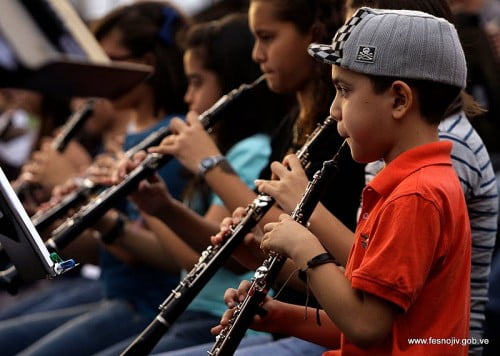
My mother, who lives in Los Angeles, has been telling me about the new, young conductor of the LA Philharmonic and his involvement in music education for disadvantaged kids but it didn’t really sink in until I watched some YouTube videos (see below) of performances by the youth symphony that he directs in his native Venezuela. Having watched these and followed up with more reading, it’s fair to say that I’m blown away by this sweeping and successful program. Here’s the story.
Thirty three years ago, Jose Antonio Abreu had an ambitious dream to bring music to the youth of Venezuela, without regard for class or race. At the first gathering, his concern was that he had only 50 music stands for an expected 100 children. This turned out not to be a problem when only 11 showed up. From these tenuous beginnings, he forged El Sistema (The System), more formally known as the Fundación del Estado para el Sistema Nacional de las Orquestas Juveniles e Infantiles de Venezuela (National Network of Youth and Children’s Orchestras of Venezuela). Today, 300,000 children attend its music schools around the country and perform in its 600 orchestras.
The goal of El Sistema is not to produce virtuoso musicians but rather to promote social organization and community development. From a 2007 New York Times article:
The most remarkable feature of the Venezuelan music-education system is its instant immersion: the children begin playing in ensembles from the moment they pick up their instruments. Their instructors say the students are learning to behave as much as they are discovering how to make music. “In an orchestra, everybody respects meritocracy, everybody respects tempo, everybody knows he has to support everyone else, whether he is a soloist or not,” explains Igor Lanz, the executive director of the private foundation that administers the government-financed sistema. “They learn that the most important thing is to work together in one common aim.” Across Venezuela the sistema has established 246 centers, known as nucleos, which admit children between 2 and 18, assign them instruments and organize them into groups with instructors. Typically practicing for two or three hours every day, the children are performing recognizable music virtually from the outset.
Maestro Gustavo Dudamel is El Sistema’s most famous graduate. Last year, at age 28, he became the Music Director of the Los Angeles Philharmonic Orchestra, while continuing as Music Director of the Gothenburg [Sweden] Symphony and the Simón Bolívar Youth Orchestra of Venezuela. (Interestingly, LA has a history of hiring the very young; Zubin Mehta was just 26 when he took over the Philharmonic in 1962.) Dudamel also brought El Sistema to Los Angeles, starting with his debut performance at the Hollywood Bowl. Jill Stewart, of the LA Weekly, blogged about the October 2009 concert:
The most amazing moment last night, by far, was when YOLA (Youth Orchestra Los Angeles), who were recruited from tough areas including gang-ridden South Central, performed Beethoven. Dudamel almost physically dragged these gifted-but-clearly-a-ways-to-go neophytes through the piece. It was incredible to watch him — and them.
Yes, you could hear a bit of discord, a few instruments coming in late, that sort of thing. But it was gorgeous — and at the triumphant ending, as the final notes rang out, the childrens’ mostly working class parents, sitting right up front in poolside seats that normally probably cost $100 or $200, absolutely ERUPTED with glee.
El Sistema has become a global movement, including established programs in Scotland and England. In the US, The New England Conservatory has launched El Sistema USA, whose first project is the Abreu Fellows Program. This program “provides tuition-free instruction and a living stipend for outstanding young postgraduate musicians, ‘passionate for their art and for social justice,’ who seek to guide the development of El Sistema programs in the U.S. and beyond. ”
To really appreciate the potential of this movement, watch the videos. The first is of Gustavo Dudamel conducting the Teresa Carreño Youth Orchestra, made up of outstanding high school (yes, high school!) musicians from El Sistema.
Also inspiring is this TED Talk by Jose Antonio Abreu, the founder of El Sistema.
Photo courtesy of the National System of Youth and Children’s Orchestras of Venezuela
My hub and I discovered El Sistema and this amazing young conductor when we caught a Ted Talk about the program. I Can't believe that this guy is only 28! The power of El Sistema's sweeping impact is so overwhelming!
http://www.ted.com/talks/lang/eng/astonishing_per…
It is an astonishing performance. I love the amount of movement by the players, clearly in response to their conductor. I've even seen it in some of the musicians in the "grown up" orchestras that Dudamel conducts.
It's a thrill to introduce someone (especially my own son, Greg) to a "revolutionary" movement, bringing education and delight to our youngsters. Please tell others how important music and the other arts are within our school programs; not at all frivolous.